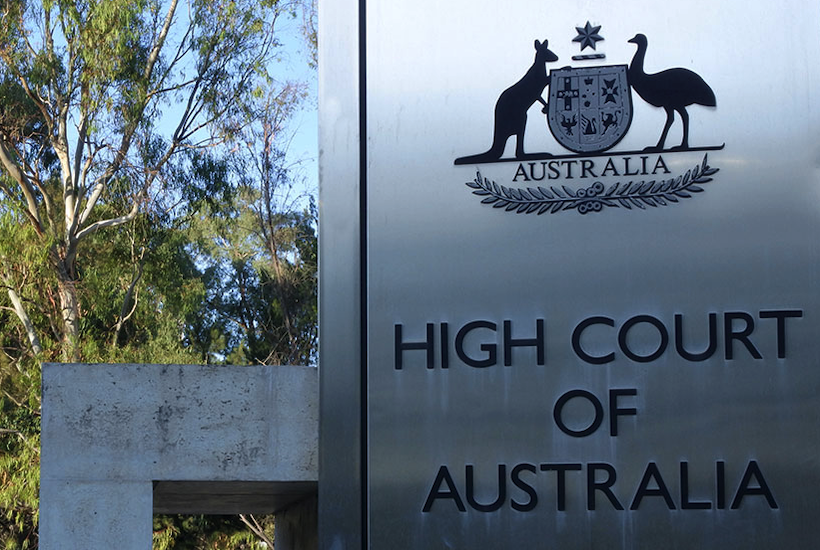Friends, Romans, Countrymen – Lend me your ears and hear my words.
This week the High Court of Australia handed down its decision in Love v Commonwealth; Thoms v Commonwealth, finding by a majority of 4v3 that two men born overseas and resident in, but not citizens of, Australia could not be deported due to each of them having indigenous Australian ancestry.
For the sake of clarity, a child born overseas to at least one Australian parent is eligible for Australian citizenship but doesn’t not become an Australian citizen as of right at birth. Either you or your Australian parent needs to make the application for citizenship. In this case, both men were resident in Australia but were not Australian citizens – they were citizens of Papua New Guinea and New Zealand, respectively.
This decision has ruffled some feathers and rightly so.
The majority essentially reason that Indigenous Australians are so connected to this land that they cannot be considered ‘aliens’ for the purposes of the operation of s. 51(xix) (naturalization and aliens power) of the Constitution (this is constitutional power the Federal Government uses to pass laws relating to citizenship and migration). They rely heavily on the decision in Mabo (No2) to justify the immutability between Indigenous Australians and Australia and affirm the test to determine whether a person is an ‘Australian Aboriginal’ as described in Mabo (no2).
Interestingly, each of the majority judgments has the hallmark of being reverse-engineered or, at the very least, appear to be tarted-up versions of the applicants’ submissions. The reasonings are long, soupy and Twister-esque in their evolution. And they play out like good ol’ progressive activism running roughshod over the constitution to sculpt a palatable and suitably woke outcome. I mean, why else distinguish modern sovereignty to the notion of sovereignty in the middle ages or refer to the writings of Pope Paul III. These notions only confuse the single and central issue: can ethnicity trump citizenship?
The minority judges make several very important points which, in my view, are fatal to the majority reasoning. First, that citizenship is not conferred by descent and race is irrelevant to the question of citizenship. This has already been decided by our High Court and remains good law. Second, that Mabo (No2) did not assist the applicants as it related to property rights and the correction of an earlier refusal to accept the existence of those native title property rights at common law. That is, native title arises by virtue of common law which attached to Australia at colonization and not as a result of traditional laws which did not survive settlement. Mabo (No2) can be distinguished from this case which seeks to create a new category of non-alien non-citizen by using the common law ‘tail’ to wag the constitutional ‘dog’. Third, part of the Australian Aboriginal test from Mabo (No2) includes a limb which requires the person in question to be accepted by members of the Aboriginal community – this would result in a determination of aboriginality being dependent on the potentially variable choices and views of the individual concerned rather than by objective absolute fact.
In an overall sense, this judgment illustrates the division between the constitutional lawyers (the minority judges) and the commercial or criminal lawyers (the majority judges). The three constitutional judges stuck together on this one and their reasoning is concise, cohesive and, in my view, correct.
So what does this all mean?
Well, this decision creates a third category of ‘persons’ who are neither aliens nor citizens. Gaegler J, summed it up perfectly saying ‘it concedes to a non-constitutional non-representative non-legally-accountable sub-national group a constitutional capacity greater than that conferred on any state parliament’. The practical effect is that this group of people owe no duty or allegiance to Australia but are able to impose themselves on Australia by reason of Australia’s inability to deport them.
Think about it this way. I am of Italian descent. My parents migrated here and were naturalized. I was born here and I am an Australian citizen. I have a strong connection to Italy – most of my family lives there and that connection grows stronger every time a €1 double espresso lands in front of me or Fendi releases a Spring Summer collection. If this decision operated in the Italian context it would mean that I could reside in Italy without being a citizen, commit a crime, and Italy would be unable to deport me to Australia. Should my descent or my connection to Italy be enough for me, as a non-citizen, to impose myself on the Italian people? Sound curious? Isn’t it just?
The fact is, people of Australian indigenous heritage are no more ‘connected’ to Australia than any other indigenous race is to their own respective nation. There are indigenous cultures all over the world and nowhere else would we consider it acceptable to have supra and subclasses of persons based on race.
The majority judgment sounds all cute and cuddly in the theoretical, sterile, and abstract pages of a High Court judgment, but there are serious concerns as to how this plays out practically. Not to mention the chaos this is likely to cause in the already delay-ridden area of migration litigation as every prospective deportee furiously fossicks through their family tree to locate an indigenous ancestor so as to evade deportation. The reality is, it sets indigenous Australians apart; it’s ethno-nationalism frocked up as progress. We are struggling to close the gap between indigenous and non-indigenous Australians as it is, and I don’t see how highlighting our differences is going to aide cultural and social unity.
So what now?
Well, for now, it is what it is. Effectively, the High Court has facilitated violent non-citizens remaining in Australia. I’m not sure how this serves any Australians let alone the indigenous community. We are already pushing the proverbial uphill trying to reduce violence in indigenous communities, so this decision is, at best, unhelpful. For Australia as a whole, it means a greater cost burden with zero benefit.
Over the last couple of days, I have heard plenty of commentators suggest that this decision cannot be changed except by a referendum on the Constitution or a reversal by the High Court of its own decision. This view stems from the following: people wanting to believe this decision is unassailable, people not actually reading the judgment, or people not taking the opportunity to think outside the square. Nestled quietly in Gaegler J’s judgment is the suggestion that the federal government could use the immigration and emigration power or the race power in order to legislate to deport non-citizens of indigenous ancestry in place of the now neutered s. 51(xix).
Given our home affairs department is quite set on protecting Australian citizens from persons of bad character, particularly those who are violent, it is highly likely that prospective deportees are going to need a bit more than the ‘vibe’ to evade deportation in the medium term. I suggest they try to ram their applications through the Court while they have clear air because you’d be unwise to think this was the end of it.
Caroline Di Russo is a lawyer, businesswomen and unrepentant nerd.
Got something to add? Join the discussion and comment below.
Got something to add? Join the discussion and comment below.
Get 10 issues for just $10
Subscribe to The Spectator Australia today for the next 10 magazine issues, plus full online access, for just $10.


























Comments
Don't miss out
Join the conversation with other Spectator Australia readers. Subscribe to leave a comment.
SUBSCRIBEAlready a subscriber? Log in